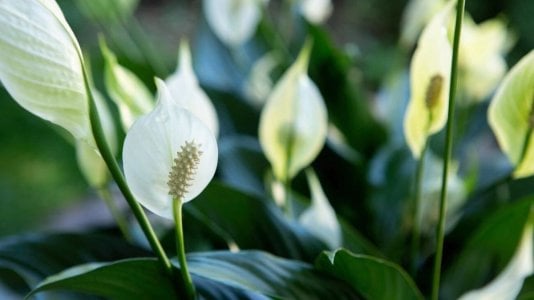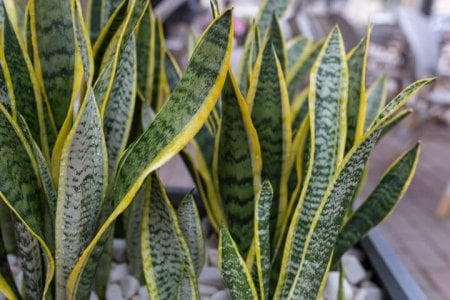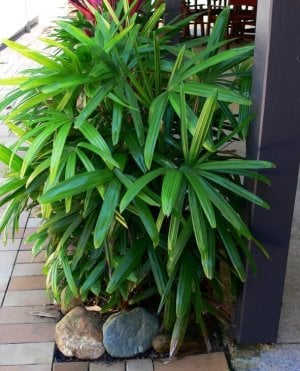Prevent mould in your home with these houseplants!
- Replies 7
We might not want to admit it, but having mould and excess moisture in the house is pretty much inevitable — especially during the colder months or during spells of wet weather.
Mould is unsightly and can be dangerous for our health (particularly for people with asthma or allergies). It also leaves ugly stains on walls, ceilings, and furniture.
Don’t even get us started on the musty smell that comes along with it!
But did you know there are some easy (and natural) ways to prevent mould from growing in your home?
According to experts, you can choose among common houseplants!
That's right, by placing a few of these hardy greens around your place, you can actually help combat mould growth.
They work as nature's dehumidifiers by sucking moisture from the air and making your home less desirable for mould spores. Neat, right?
So if you're struggling with a damp house, consider giving these plants a go:
Snake Plants (Sansivieria trifasciata)
Known as Viper's Bowstring Hemp, Saint George’s Sword, and — we are not making this up — Mother-In-Law’s Tongue, Snake Plants are one of the best options for combating humid conditions at home.
These plants with blade-like leaves are hardy and adaptable, which makes them perfect for beginners (i.e. those of us who sometimes forget to water our plants!), and they prefer warm temperatures and bright sunlight. Plus, they look great as indoor decoration!
Snake Plants also happen to filter out household pollutants according to research by the US National Aeronautics and Space Administration (NASA), so not only will they make your place smell fresher, they'll actually purify the air around you as well.
But please take note that this plant can be harmful to cats and dogs because of the toxins they contain.
Peace Lilies (Spathiphyllum wallisii)

Peace Lilies are another great way to remove airborne mould from humid areas in your home such as bathrooms or laundry rooms.
The humble plants thrive in moist areas naturally, so they’re more than able to suck the moisture that moulds need to grow.
What’s more, these plants are also easy to grow. Just water them every now and then and don’t place them in direct sunlight, and you’re good to go!
But like the Snake Plant, Peace Lilies also have compounds toxic to pets and even small children, so you might want to reconsider before dehumidifying your home the natural way.
Palms
There are many varieties of palms, and it is said that they are all efficient at absorbing moisture with their many leaves, also called fronds.
In particular, the Lady Palm (Rhapis excelsa), Parlour Palm (Chamaedorea elegans), and Kentia Palm (Howea forsteriana) are suitable for growing indoors.
Most of these plants, like Peace Lilies and Snake Plants, are also relatively easy to grow, though some kinds may need to be repotted every once in a while.
Another incentive to choose palms is that their leaves are not considered poisonous to pets (except the Sago Palm), so you get less moisture in your home and give it a nice visual addition without the added risk to your furry companion.
If you’re considering other alternatives to handle mould, you might want to check out these other tips for a mould-free home, or how to deal with mould using easy DIY recipes.
There’s also the story of one unfortunate family driven out of their dream home by black mould after a botched building job.
So, what is your reaction to this story? Do you know of other plants that could be used to suck up home moisture?
Share your reactions and suggestions in the comments below!
Mould is unsightly and can be dangerous for our health (particularly for people with asthma or allergies). It also leaves ugly stains on walls, ceilings, and furniture.
Don’t even get us started on the musty smell that comes along with it!
But did you know there are some easy (and natural) ways to prevent mould from growing in your home?
According to experts, you can choose among common houseplants!
That's right, by placing a few of these hardy greens around your place, you can actually help combat mould growth.
They work as nature's dehumidifiers by sucking moisture from the air and making your home less desirable for mould spores. Neat, right?
So if you're struggling with a damp house, consider giving these plants a go:
Snake Plants (Sansivieria trifasciata)
Known as Viper's Bowstring Hemp, Saint George’s Sword, and — we are not making this up — Mother-In-Law’s Tongue, Snake Plants are one of the best options for combating humid conditions at home.
These plants with blade-like leaves are hardy and adaptable, which makes them perfect for beginners (i.e. those of us who sometimes forget to water our plants!), and they prefer warm temperatures and bright sunlight. Plus, they look great as indoor decoration!
Snake Plants also happen to filter out household pollutants according to research by the US National Aeronautics and Space Administration (NASA), so not only will they make your place smell fresher, they'll actually purify the air around you as well.
But please take note that this plant can be harmful to cats and dogs because of the toxins they contain.
Peace Lilies (Spathiphyllum wallisii)

Peace Lilies are a name used for around 40 types of flowering plants in the Spathiphyllum genus. Credit: Bunnings
Peace Lilies are another great way to remove airborne mould from humid areas in your home such as bathrooms or laundry rooms.
The humble plants thrive in moist areas naturally, so they’re more than able to suck the moisture that moulds need to grow.
What’s more, these plants are also easy to grow. Just water them every now and then and don’t place them in direct sunlight, and you’re good to go!
But like the Snake Plant, Peace Lilies also have compounds toxic to pets and even small children, so you might want to reconsider before dehumidifying your home the natural way.
Palms
There are many varieties of palms, and it is said that they are all efficient at absorbing moisture with their many leaves, also called fronds.
In particular, the Lady Palm (Rhapis excelsa), Parlour Palm (Chamaedorea elegans), and Kentia Palm (Howea forsteriana) are suitable for growing indoors.
Most of these plants, like Peace Lilies and Snake Plants, are also relatively easy to grow, though some kinds may need to be repotted every once in a while.
Another incentive to choose palms is that their leaves are not considered poisonous to pets (except the Sago Palm), so you get less moisture in your home and give it a nice visual addition without the added risk to your furry companion.
If you’re considering other alternatives to handle mould, you might want to check out these other tips for a mould-free home, or how to deal with mould using easy DIY recipes.
There’s also the story of one unfortunate family driven out of their dream home by black mould after a botched building job.
So, what is your reaction to this story? Do you know of other plants that could be used to suck up home moisture?
Share your reactions and suggestions in the comments below!









